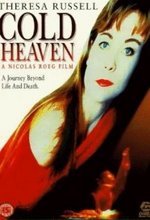
COLD HEAVEN
US, 1992, 102 minutes, Colour.
Teresa Russell, Mark Harmon, James Russo, Will Patton, Richard Bradford, Talia Shire, Julie Carmen.
Directed by Nicolas Roeg.
Cold Heaven did not receive a great release at the time of its making. However, it is an interesting version of a novel by Brian Moore. Allegedly, Moore was not happy with the adaptation even though it stays close to his novel.
Moore was an Irishman who migrated to Canada, became a Canadian citizen and worked in Los Angeles. Film versions of his novels include Catholics (1973), The Lonely Passion of Judith Hearne (1987), Black Robe (1991) and The Statement (2003). Moore writes brief novels and is often likened to Graham Greene. Though declaring himself an atheist, he still treats Catholic themes in most of his work. He is also fascinated in this film with prayer, healing power, sexuality and betrayal. In this way, it is a cousin of Graham Greene's The End of the Affair.
The film was directed by Nicolas Roeg (Bad Timing, Eureka, The Man Who Fell to Earth, Don't Look Now) who often works with his wife, Teresa Russell. She plays the wife of a doctor whom she is betraying with another doctor (James Russo as the doctor, Mark Harmon as the husband). When her husband is injured in a boating accident, she prays that he will be healed. He is and this poses religious and psychological problems for the wife, including the revelation that she has had visions of the Virgin Mary and is to go to a convent on the top of a cliff near San Francisco where she is supposed to authorise a shrine. She is very sceptical but continues to have strange religious experiences. Richard Bradford is the parish priest, Will Patton a sympathetic priest who helps her, Talia Shire the nun in the convent who shares her visions.
The film is interesting in terms of Catholicism, Catholic guilt, healing and the power of miracles.
1. The impact of the film? As a moral drama? As a religious drama with mystical touches? The work of Brian Moore, his novels and their religious themes? His professed atheism or agnosticism but his exploring themes of faith and God, the miraculous?
2. The Mexican settings, the water, hotels and the affluent world? Hospitals and motels? The Californian cliffs, the convent?
3. The special effects for the religious experience, especially that at the cliffs?
4. The title, themes of heaven, sin and guilt, repentance, forgiveness, the presence of God? Marie and her continually probing the problem of God's presence and absence in her life?
5. Teresa Russell as Marie, the religious significance of her name? Her affair with Daniel, its passionate nature, the deceit? Taking place over a period of time, the motel meetings after the meeting at the conference? Marie and her relationship with Alex? The tension in the marriage? His confidence in her? Boating, the accident and its aftermath? Her taking Alex to the hospital? Her grieving, caring? His death? The phone calls and Daniel trying to contact her? The discovery of Alex's body missing? Her travelling to San Francisco?
6. Going to the cliffs, the memory of her experience the year before and the cliffs? Her walking, looking, the mystery for her life? Her being compelled to return? Going to the convent, the chapel? The nuns? Her going to the priest, the monsignor and his listening, his scepticism, assuring her that she had done her duty? Her discussions with Father Niles, his coming to see her? Pouring out her heart? Feeling that she had to finish the mission that was given to her while not believing in it?
7. Alex's return, his being alive but ill, her decision to care for him? His being drawn into the mystery, the experience of the miraculous?
8. Daniel, the doctor, meeting her at the conference, the affair, his phone calls, the break-up? His visit to Marie, the clash? His betrayal of Alex? The conflict with his wife?
9. The monsignor, his acting the role of the sympathetic priest, listening, puzzled, reassuring Marie? Father Niles, the younger priest, seeing him jogging, a more humane presentation of the priest than the clerical monsignor? Their discussions, his going to visit her, her explanations of what had happened, his listening attentively, his advice?
10. The nun, her dreams, religious experience, the connection with Marie, the mystical connection? Seeing the nuns in the convent, at prayer? The history of the wreck, the history of the statue? The background of the history of Marian shrines? Mary and Marie, her feeling that she had to complete her mission and restore the statue and the shrine?
11. Marie's future, the break with Daniel, the possible reconciliation with Alex? How permanent would be the impact of this religious experience on her life and her future?